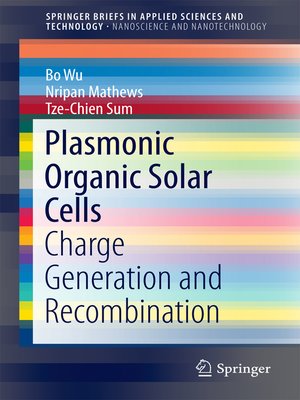Plasmonic Organic Solar Cells
ebook ∣ Charge Generation and Recombination · SpringerBriefs in Applied Sciences and Technology
By Bo Wu

Sign up to save your library
With an OverDrive account, you can save your favorite libraries for at-a-glance information about availability. Find out more about OverDrive accounts.
Find this title in Libby, the library reading app by OverDrive.



Search for a digital library with this title
Title found at these libraries:
| Library Name | Distance |
|---|---|
| Loading... |
This book explores the incorporation of plasmonic nanostructures into organic solar cells, which offers an attractive light trapping and absorption approach to enhance power conversion efficiencies. The authors review the latest advances in the field and discuss the characterization of these hybrid devices using a combination of optical and electrical probes.
Transient optical spectroscopies such as transient absorption and transient photoluminescence spectroscopy offer powerful tools for observing charge carrier dynamics in plasmonic organic solar cells. In conjunction with device electrical characterizations, they provide unambiguous proof of the effect of the plasmonic nanostructures on the solar cells' performance.
However, there have been a number of controversies over the effects of such integration – where both enhanced and decreased performance have been reported. Importantly, the new insights into the photophysics and charge dynamics of plasmonic organic solar cells that these spectroscopy methods yield could be used to resolve these controversies and provide clear guidelines for device design and fabrication.
Transient optical spectroscopies such as transient absorption and transient photoluminescence spectroscopy offer powerful tools for observing charge carrier dynamics in plasmonic organic solar cells. In conjunction with device electrical characterizations, they provide unambiguous proof of the effect of the plasmonic nanostructures on the solar cells' performance.
However, there have been a number of controversies over the effects of such integration – where both enhanced and decreased performance have been reported. Importantly, the new insights into the photophysics and charge dynamics of plasmonic organic solar cells that these spectroscopy methods yield could be used to resolve these controversies and provide clear guidelines for device design and fabrication.







